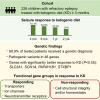Genetic aetiologies in relation to response to the ketogenic diet in 226 children with epilepsy
- PMID: 40290421
- PMCID: PMC12022961
- DOI: 10.1093/braincomms/fcaf134
Genetic aetiologies in relation to response to the ketogenic diet in 226 children with epilepsy
Abstract
A ketogenic diet is used in children with drug-resistant epilepsy but predictors for efficacy are largely lacking. Our aim was to evaluate if causative genetic variants could predict seizure response to the ketogenic diet. A cohort study of 226 children with refractory epilepsy and classic ketogenic diet treatment for at least 3 months (76.9% of the 294 who started) was performed. The median age at diet start was 5.1 years (range 0.1-17.8), 118 were girls and 108 boys. They had previous trials of a median of 6.0 anti-seizure medications (range 0-12) and intellectual disability was found in 87%. Seizure response (≥50% reduction) was found in 138/226 patients (61.1%) at 3 months, 121 (53.5%) at 6 months, 107 (47.3%) at 1 year and in 80 (37.0%) at 2 years follow-up of ketogenic diet. Age of epilepsy onset was lower and combined epilepsy type less common in responders compared to non-responders but no differences were found for specific seizure types, ketogenic ratio or beta-hydroxybutyric acid blood levels. A causative pathogenic/likely pathogenic variant was detected in 107/153 = 69.9% in 48 different genes. Next generation sequencing was used in 91/226 (40%) cases with a diagnostic yield of 58.2% (53/91). In comparison with cases without a revealed genetic aetiology, patients with a causative genetic variant had less atonic seizures and epileptic spasms and a better seizure response with 17.3% seizure free and 25% with >90% seizure reduction at 2-year follow-up. Causative variants in SLC2A1, SCN1A, STXBP1 and PAFAH1B1 showed significant diet response (P < 0.05) and good efficacy was also associated with DEPDC5, GLDC, KCNT1, PDHA1, SLC25A12 and TSC1. Causative variants in COL4A1 and DYNC1H1 were among genes linked to a lack of response. To our knowledge not described previously, we report a good ketogenic diet response related to causative variants in CSNK2A1, FARS2, GABRB3, GRIN1, KCNA2, KCTD3, STX1B and SLC16A2 but a lack of response for causative variants in CLN5, GLI3, MACF1, MAGEL2, NANS, NEMO/IKBKG, RORB, SLC17A5 and UFSP2. After grouping of genes into functional groups, causative variants in transporter genes had the best response (P = 0.009) and variants in other membrane-related proteins (ion channels and neurotransmitter receptors) also showed good efficacy. However, the gene group related to cell structural integrity and/or homeostasis had the worst diet response (P = 0.00006). In conclusion, our results support that causative genetic variants may be used as prognostic markers of ketogenic diet response, constituting an example in the expanding area of precision medicine.
Keywords: WGS; epilepsy; genetic causative variants; ketogenic diet; seizures.
© The Author(s) 2025. Published by Oxford University Press on behalf of the Guarantors of Brain.
Conflict of interest statement
The authors report no competing interests.
Figures


References
-
- Kwan P, Arzimanoglou A, Berg AT, et al. Definition of drug resistant epilepsy: Consensus proposal by the ad hoc task force of the ILAE commission on therapeutic strategies. Epilepsia. 2010;51(6):1069–1077. - PubMed
-
- Freeman JM, Vining EP, Pillas DJ, Pyzik PL, Casey JC, Kelly LM. The efficacy of the ketogenic diet-1998: A prospective evaluation of intervention in 150 children. Pediatrics. 1998;102(6):1358–1363. - PubMed
-
- Neal EG, Chaffe H, Schwartz RH, et al. A randomized trial of classical and medium-chain triglyceride ketogenic diets in the treatment of childhood epilepsy. Epilepsia. 2009;50(5):1109–1117. - PubMed
-
- Lambrechts DA, de Kinderen RJ, Vles JS, de Louw AJ, Aldenkamp AP, Majoie HJ. A randomized controlled trial of the ketogenic diet in refractory childhood epilepsy. Acta Neurol Scand. 2017;135(2):231–239. - PubMed
-
- Gavrilovici C, Rho JM. Metabolic epilepsies amenable to ketogenic therapies: Indications, contraindications, and underlying mechanisms. J Inherit Metab Dis. 2021;44(1):42–53. - PubMed
LinkOut - more resources
Full Text Sources
Miscellaneous
